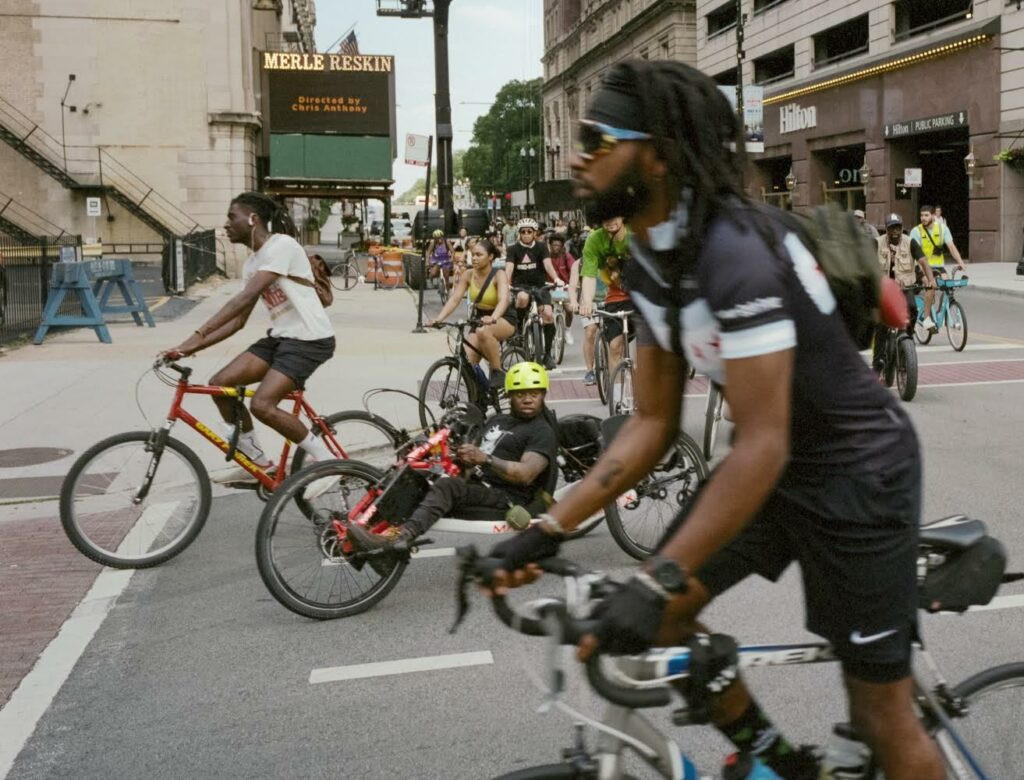For Shawnee Dez, the simple act of biking transcends mere recreation; it’s a powerful catalyst for community empowerment and collective liberation. Four years ago, Dez channeled this belief into action by establishing Black JoyRide, an annual group bike ride of significant scale held on Juneteenth, complemented by ongoing social rides throughout the year.
“My vision is expansive, yet fundamentally, it’s about harnessing the unifying power of biking to forge stronger connections among Black individuals,” Dez explains. “By strengthening these bonds within the Black community, we naturally extend our reach to our neighbors, fostering inclusivity across all ethnicities.”
Dez’s personal journey with biking has long been intertwined with self-care and the pursuit of freedom. Growing up in Jeffery Manor, her bicycle was more than just a mode of transport; it was a key to unlocking independence, allowing her to explore beyond the familiar streets of her neighborhood. This early experience instilled in her a deep appreciation for the liberating feeling that comes with cycling, especially when shared with others in a bike crew.
The summer of 2020, marked by the peak of the COVID-19 pandemic and widespread racial justice movements, amplified the need for meaningful human connection. The tragic murder of Oluwatoyin Salau, a young community activist in Florida, deeply resonated and spurred Dez to action. Instead of opting for traditional protests, Dez envisioned a different approach to collective healing: community bike rides. With the crucial support of co-planner David Marby and other dedicated collaborators, the inaugural Black Joyride was rapidly organized in just five days. On Juneteenth of 2020, an impressive gathering of over 200 cyclists convened at the Johnson Publishing Building in downtown Chicago and together, as a united crew, they rode south towards the DuSable Black History Museum and Education Center.
While Black JoyRide is centered on themes of joy and liberation, its foundation is also rooted in directly addressing the systemic violence and segregation that disproportionately affect Black communities in Chicago and across the nation. This pervasive discrimination extends into vital areas like safe and accessible transportation infrastructure. Despite Chicago’s generally low ranking in bikeability and safety, these shortcomings are acutely felt in the city’s West and South Sides, where inadequate infrastructure puts Black cyclists at greater risk, accounting for nearly half of all fatal biking accidents. Creating a strong bike crew and community is one way to address these disparities and promote safety in numbers.
“When I cycle through our city, I’m acutely aware of the deep-seated segregation and redlining that shapes our experiences, and the heightened vigilance that Black individuals, particularly Black women, must maintain,” Dez reflects. “Mobility is paramount – moving our bodies, processing intense emotions, and doing so collectively with a group of people can be incredibly empowering, helping us overcome feelings of helplessness.”
 Diverse group of cyclists participate in the Black JoyRide Juneteenth community bike ride in Chicago, promoting unity and joy through crew bikes.
Diverse group of cyclists participate in the Black JoyRide Juneteenth community bike ride in Chicago, promoting unity and joy through crew bikes.
Joining the fifth annual Juneteenth ride this year, cycling from the Formal Gardens to the Salt Shed’s Black Freedom Market, I personally experienced the empowering force of riding with a diverse crew of fellow cyclists down Michigan Avenue. This collective energy fostered a sense of safety I had rarely encountered biking in the city before. Now operating as a collective, Black JoyRide continues to champion mental and physical well-being through regular group bike rides held throughout Chicago’s warmer seasons. In collaboration with local community organizations, these rides not only showcase the rich beauty of South Side neighborhoods but also serve as educational opportunities, informing participants about vital local initiatives and fostering a stronger sense of community among bike crews.
Looking ahead, Dez envisions expanding the reach of Black JoyRide beyond city limits, connecting with bike communities in other states. Her long-term aspiration is to establish a physical bike shop on the South Side—a dedicated space where, in Dez’s words, “community becomes even more attainable.” This brick-and-mortar location would serve as a hub for bike crews and enthusiasts, further solidifying Black JoyRide’s commitment to community building through cycling.
Stay connected with upcoming rides and events by following @blackjoyride on Instagram.
